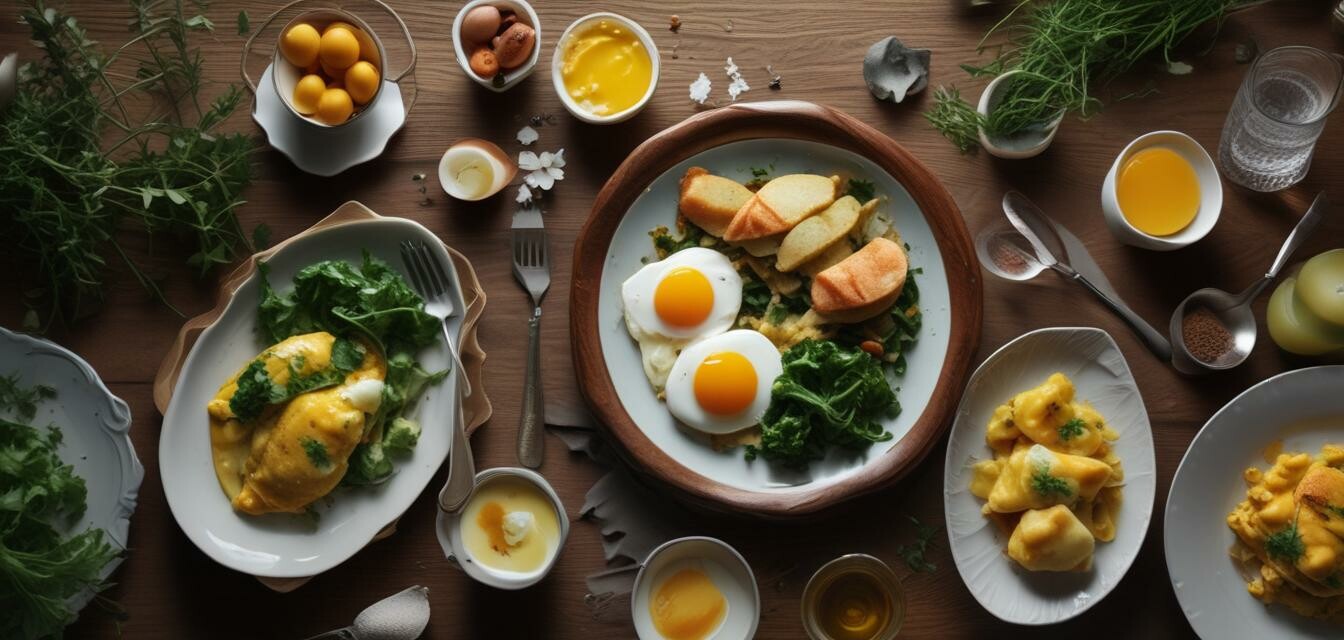
Perfecting Your Egg Cookery Skills
Key Takeaways
- Eggs are versatile and can be cooked in various ways such as boiling, poaching, and scrambling.
- Each cooking method requires specific techniques to achieve the best texture and flavor.
- Practice is key to mastering egg cookery; don’t be afraid to experiment.
- Understanding the science behind egg cookery can enhance your overall skills.
Eggs are a staple in many kitchens, cherished for their versatility and nutritional value. Whether you're a novice or a seasoned cook, mastering egg cookery is a crucial skill that opens up a world of culinary possibilities. In this guide, we’ll delve into various egg cooking techniques, providing tips and methods to help you perfect your egg cooking skills, from poaching to scrambling.
Understanding Eggs: The Basics
Before diving into the cooking techniques, it's essential to understand the different types of eggs available.
| Type of Egg | Description |
|---|---|
| Chicken Eggs | The most common type, available in various colors (white, brown). |
| Duck Eggs | Richer flavor, larger than chicken eggs, great for baking. |
| Quail Eggs | Small, delicate, often used in gourmet dishes. |
| Farm Fresh Eggs | Collected from local farms, often richer in flavor. |
Popular Cooking Techniques for Eggs
Here are the most popular methods for cooking eggs along with tips to get the best results.
1. Boiling Eggs
Boiling eggs is a straightforward process, but perfecting the time is essential for the desired egg consistency.
- Soft Boiled: Boil for 4-6 minutes for a runny yolk.
- Hard Boiled: Boil for 9-12 minutes for a firm yolk.
2. Poaching Eggs
Poached eggs are a favorite for many dishes like Eggs Benedict. Here’s how to achieve the perfect poached egg:
- Bring water to a gentle simmer, add a splash of vinegar.
- Crack an egg into a bowl and gently slide it into the water.
- Cook for 3-4 minutes until the white is set, but the yolk remains runny.
- Remove with a slotted spoon and serve immediately.
3. Scrambling Eggs
Scrambled eggs are quick to prepare but require attention for perfect texture. Consider the following tips:
- Use low heat and constantly stir for creamy, soft eggs.
- Add a splash of milk or cream for extra richness.
- Experiment with ingredients like cheese, herbs, or vegetables for added flavor.
4. Making an Omelet
A fluffy omelet can be a delightful meal any time of day. Here’s how to create one:
- Beat 2-3 eggs in a bowl, add salt and pepper.
- Heat a non-stick skillet on medium, add a little butter.
- Pour in the eggs and let them cook without stirring for about 2 minutes.
- Add fillings like cheese, herbs, or cooked meats, then fold the omelet in half.
- Cook for another minute to allow the cheese to melt.
Helpful Tips for Perfecting Egg Cookery
Beginner’s Section: Tips for Success
- Always use fresh eggs for the best flavor.
- Practice different techniques to find out what you enjoy most.
- Invest in a good quality non-stick pan; it makes cooking and cleaning easier.
- Keep your heat low for delicate eggs like poached or scrambled.
- Make sure to read your recipe thoroughly before starting.
Common Mistakes When Cooking Eggs
Even experienced cooks can make mistakes when cooking eggs. Here are a few to avoid:
- Cooking on too high heat, leading to uneven cooking.
- Not using enough fat, causing the eggs to stick.
- Overcooking, resulting in dry texture.
- Skipping the seasoning, which can make the dish bland.
Exploring Egg Dishes
Eggs can be incorporated into a variety of dishes. Here are a few ideas to spark your creativity: - Egg salad - Frittatas - Shakshuka - Quiches - Deviled eggs
For more about enhancing your culinary repertoire, you can check out our Cooking Buying Guides for useful tips and tools.
Pros
- Eggs are affordable and widely available.
- High in protein and versatile in recipes.
- Easy to cook and can be prepared in various styles.
Cons
- Some people may have allergies or dietary restrictions.
- Requires specific skills to perfect diverse cooking techniques.
- Overcooking can lead to a rubbery texture.
Conclusion
Perfecting your egg cookery skills can significantly enhance your cooking repertoire. With various techniques to explore, including boiling, poaching, scrambling, and making omelets, the possibilities are endless. Don’t hesitate to experiment and make the process fun! Remember, practice makes perfect, so get cracking and start cooking!
For more tips on cooking techniques, visit our Cooking Tips & Techniques section. Cook well and enjoy your culinary journey!